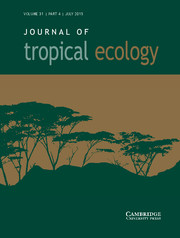Crossref Citations
This article has been cited by the following publications. This list is generated based on data provided by
Crossref.
France, R. L.
1999.
Relationships between DOC concentration and epilithon stable isotopes in boreal lakes.
Freshwater Biology,
Vol. 41,
Issue. 1,
p.
101.
Thimdee, Wirongrong
Deein, Gridsada
Sangrungruang, Chanin
and
Matsunaga, Katsuhiko
2001.
Stable Carbon and Nitrogen Isotopes of Mangrove Crabs and Their Food Sources in a Mangrove-fringed Estuary in Thailand.
BENTHOS RESEARCH,
Vol. 56,
Issue. 2,
p.
73.
Saenger, Peter
2002.
Mangrove Ecology, Silviculture and Conservation.
p.
303.
Kennedy, H.
Gacia, E.
Kennedy, D.P.
Papadimitriou, S.
and
Duarte, C.M.
2004.
Organic carbon sources to SE Asian coastal sediments.
Estuarine, Coastal and Shelf Science,
Vol. 60,
Issue. 1,
p.
59.
Guest, Michaela A.
and
Connolly, Rod M.
2004.
Fine-scale movement and assimilation of carbon in saltmarsh and mangrove habitat by resident animals.
Aquatic Ecology,
Vol. 38,
Issue. 4,
p.
599.
Guest, Michaela A.
and
Connolly, Rod M.
2005.
Fine-scale movement and assimilation of carbon in saltmarsh and mangrove habitat by resident animals.
Aquatic Ecology,
Vol. 38,
Issue. 4,
p.
599.
Connolly, Rod M.
Gorman, Daniel
and
Guest, Michaela A.
2005.
Movement of carbon among estuarine habitats and its assimilation by invertebrates.
Oecologia,
Vol. 144,
Issue. 4,
p.
684.
McConnachie, J.L.
and
Petticrew, E.L.
2006.
Tracing organic matter sources in riverine suspended sediment: Implications for fine sediment transfers.
Geomorphology,
Vol. 79,
Issue. 1-2,
p.
13.
Linton, Stuart M.
and
Greenaway, Peter
2007.
A review of feeding and nutrition of herbivorous land crabs: adaptations to low quality plant diets.
Journal of Comparative Physiology B,
Vol. 177,
Issue. 3,
p.
269.
Bucci, J.P.
Rebach, S.
DeMaster, D.
and
Showers, W.J.
2007.
A comparison of blue crab and bivalve δ15N tissue enrichment in two North Carolina estuaries.
Environmental Pollution,
Vol. 145,
Issue. 1,
p.
299.
Demopoulos, Amanda W. J.
Fry, Brian
and
Smith, Craig R.
2007.
Food web structure in exotic and native mangroves: a Hawaii–Puerto Rico comparison.
Oecologia,
Vol. 153,
Issue. 3,
p.
675.
Bouillon, S.
Connolly, R.M.
and
Lee, S.Y.
2008.
Organic matter exchange and cycling in mangrove ecosystems: Recent insights from stable isotope studies.
Journal of Sea Research,
Vol. 59,
Issue. 1-2,
p.
44.
Pape, Ellen
Muthumbi, Agnes
Kamanu, Chomba Peter
and
Vanreusel, Ann
2008.
Size-dependent distribution and feeding habits of Terebralia palustris in mangrove habitats of Gazi Bay, Kenya.
Estuarine, Coastal and Shelf Science,
Vol. 76,
Issue. 4,
p.
797.
Kristensen, Erik
2008.
Mangrove crabs as ecosystem engineers; with emphasis on sediment processes.
Journal of Sea Research,
Vol. 59,
Issue. 1-2,
p.
30.
Cannicci, Stefano
Burrows, Damien
Fratini, Sara
Smith, Thomas J.
Offenberg, Joachim
and
Dahdouh-Guebas, Farid
2008.
Faunal impact on vegetation structure and ecosystem function in mangrove forests: A review.
Aquatic Botany,
Vol. 89,
Issue. 2,
p.
186.
Alfaro, Andrea C.
2008.
Diet of Littoraria scabra, while vertically migrating on mangrove trees: Gut content, fatty acid, and stable isotope analyses.
Estuarine, Coastal and Shelf Science,
Vol. 79,
Issue. 4,
p.
718.
Nagelkerken, I.
Blaber, S.J.M.
Bouillon, S.
Green, P.
Haywood, M.
Kirton, L.G.
Meynecke, J.-O.
Pawlik, J.
Penrose, H.M.
Sasekumar, A.
and
Somerfield, P.J.
2008.
The habitat function of mangroves for terrestrial and marine fauna: A review.
Aquatic Botany,
Vol. 89,
Issue. 2,
p.
155.
Abrantes, Kátya
and
Sheaves, Marcus
2008.
Incorporation of terrestrial wetland material into aquatic food webs in a tropical estuarine wetland.
Estuarine, Coastal and Shelf Science,
Vol. 80,
Issue. 3,
p.
401.
Granek, Elise F.
Compton, Jana E.
and
Phillips, Donald L.
2009.
Mangrove-Exported Nutrient Incorporation by Sessile Coral Reef Invertebrates.
Ecosystems,
Vol. 12,
Issue. 3,
p.
462.
Abrantes, Kátya
and
Sheaves, Marcus
2009.
Food web structure in a near-pristine mangrove area of the Australian Wet Tropics.
Estuarine, Coastal and Shelf Science,
Vol. 82,
Issue. 4,
p.
597.

